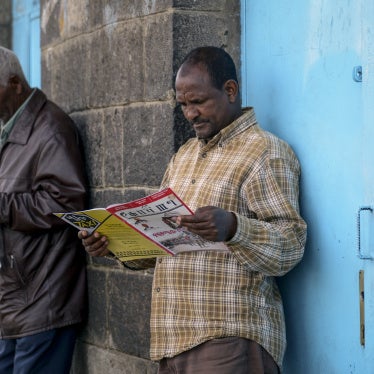Swaziland’s deteriorating human rights record just got worse today, when a court sentenced a human rights lawyer and an editor to two years in prison – all because they spoke out against the country’s chief justice.
Police arrested lawyer Thulani Maseko, along with the editor of Swaziland’s the Nation newspaper, Bheki Makhubu, after the Nation published two articles written by Maseko that criticized Swaziland’s chief justice. Maseko and Makhubu were charged with contempt of court and spent more than three months in prison, before and during their trial.
The Southern African Development Community (SADC) and neighboring South Africa should be leading the way in amplifying local voices that highlight the country’s political crisis and pressing for an end to the widespread human rights abuses in the country. But their silence on the convictions is deafening.
Maseko and Makhubu’s guilty verdict surprised few, if any. For years Swaziland has been run as an absolute monarchy by King Mswati III. Mswati, in power since 1986, exercises absolute authority over the cabinet, Parliament, and judiciary. Under his rule there has been a significant deterioration in human rights conditions and respect for the rule of law. Political parties are banned and the judiciary is severely compromised.
The Swazi authorities have reacted to criticism by using repressive and violent tactics to clamp down on political activism, independent media reporting, and peaceful protests. Journalists and activists who seek to highlight Swaziland’s problems are often subjected to harassment, beatings, arbitrary arrest, and sometimes torture. The government has also misused the 2008 Suppression of Terrorism Act to target independent organizations by accusing them of being “terrorist” groups, and to harass civil society activists through abusive surveillance and unlawful searches of homes and offices.
Despite all this, the international community has been slow to react. Last month, US President Barack Obama officially removed Swaziland from the list of African countries which benefit from the African Growth and Opportunity Act (AGOA), citing the slow pace of democratic reform and the country’s poor human rights record. But there has been little reaction to the human rights situation by regional leaders.
SADC and South Africa need to urge the Swazi authorities to respect fundamental freedoms, including the rights to freedom of association, assembly, and expression, and to remove legislative and practical restrictions on the rights to political participation. For a start, they should condemn the unwarranted prosecution of Maseko and Makhubu and call for their unconditional release.







